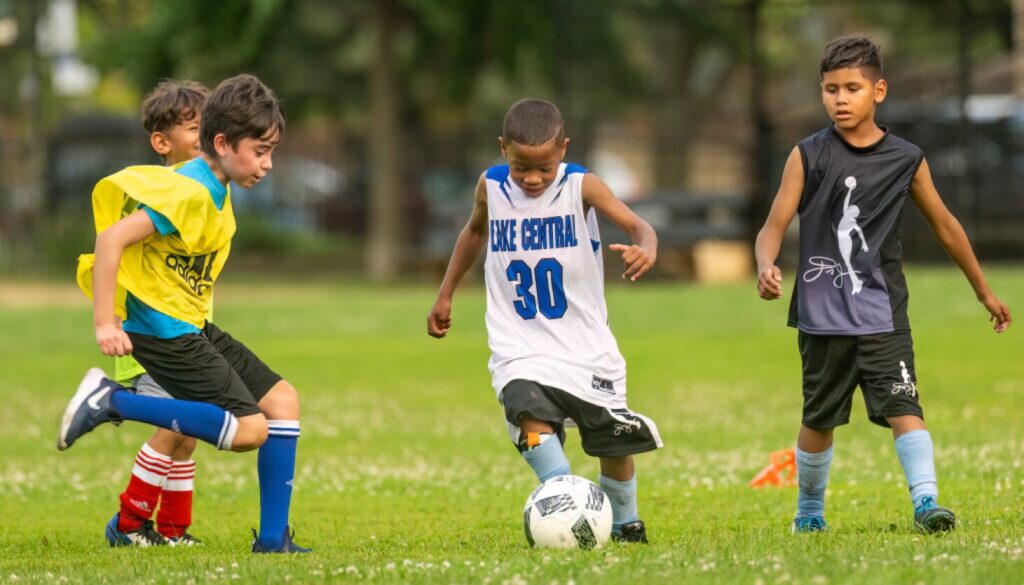When 8-year-old Mathias Bastow arrived for the first time on a recent afternoon at Skinner Park on Chicago's west side, he excitedly gazed out onto the field, where about 15 kids were getting ready to start soccer practice. A volunteer greeted him and pointed to a box full of shoes and shin guards.
Mathias helped his father pick out the right size and quickly followed his mother's instructions while she picked up the clipboard and signed.
“Matias is a very active boy,” Irene Santos, Matias' mother, said in Spanish. “He loves to run, and we brought him here because he will develop better by doing this kind of activity while doing what he loves.”
Matias and his parents live in a city-run shelter on Ogden Street. Like many immigrant parents, they know their son's journey has been exhausting, traversing dangerous jungles and dangerous border towns. Kids like Matias, who are new to the city, don't have access to programs that allow them to play and just be kids. This new soccer program, called Amigos Unidos FC (United Friends in English), has been great for Matias.
Amigos Unidos FC serves children of immigrants, primarily from Colombia and Venezuela. The program, which began in June and will run twice a week through the first week of August, isn't run by any specific agency or nonprofit. Instead, it's a group of college students and their friends who wanted to create a unique space for young asylum seekers with a passion for soccer.
“These kids have come a long way to get here,” said Hannah McGee, a pre-med student at the University of Illinois at Urbana-Champaign. “They need support, an outlet and consistency.”
Maggie, who played soccer as a child, has been closely following the migrant crisis in Chicago last year and is thinking about how to channel her love of sports into something immigrant kids can enjoy.
“I've heard there are lots of resources out there for families, but nothing for children,” she said.
Maggie and her friend Sofia Castro made flyers and distributed them with other volunteers at nearby parks and migrant shelters.
“I've been emailing back and forth trying to figure out what's going on with the park. We started a GoFundMe and sent money to family and friends. We managed to raise $1,000,” said Castro, a UIUC dental student.
Cleats, jerseys, shin guards and socks were also donated by local soccer organizations in the area, including the Chicago Edge Soccer Club and the Chicago Red Stars.
During practice, the kids do warm-ups and team-building exercises.
After about 30 minutes of practice and play, Matias, quiet and shy at first, is kicking around the ball and totally engaged. “What I like most about Chicago is the soccer training here,” he said in Spanish during a hydration break.
Despite the heat and humidity, other young participants are equally enthusiastic.
“What I like most about this program is that I get to play the sport I love, I get to participate with my friends and we all win together,” said Irbel Benavides, 10, from Venezuela.
Finding free programs for children can be difficult. Many immigrant parents are unaware of official city park district summer programs. These programs are in high demand and have difficult registration processes. Transportation can be a barrier, and other private summer camps are expensive.
Some migrant parents say it's difficult to let their children play at the shelters, where strict rules mean children are not allowed to run around or make noise.
Eileen Santos and her husband watched Mathias play soccer from a nearby bench. In addition to focusing on finding permanent employment and housing, they want to find structured activities for Mathias. Skinner Park's soccer program is the first step.
“It was hard to adapt to a new world,” Santos says. “The idea was, [Mathias] enjoying.”
For a moment, her son seemed normal, running around outside like any other 8-year-old in the city.
Adriana Cardona-Maguigad covers immigration issues for WBEZ. Follow her on X Adriana Card Mug.


